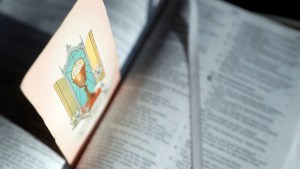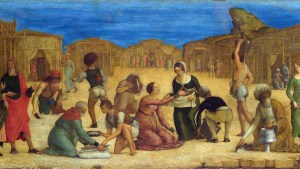The celebration of the Eucharist is firmly drawn from the Bible, especially the Last Supper and the Passion, death and resurrection of Jesus.
At the same time, God had been preparing his people for thousands of years, and planted seeds of the Eucharist in every age.
Here is a sampling of seven particular events that the Catechism of the Catholic Churchexplains are recalled at Mass, sometimes explicitly in the Eucharistic prayer or implicitly in a more symbolic way.
1
Melchezidek
Thus in the Offertory we give thanks to the Creator for bread and wine, fruit of the “work of human hands,” but above all as “fruit of the earth” and “of the vine” — gifts of the Creator. The Church sees in the gesture of the king-priest Melchizedek, who “brought out bread and wine,” a prefiguring of her own offering.
CCC 1333
2
Exodus
But they also received a new significance in the context of the Exodus: the unleavened bread that Israel eats every year at Passover commemorates the haste of the departure that liberated them from Egypt
3
Manna in the desert
[T[he remembrance of the manna in the desert will always recall to Israel that it lives by the bread of the Word of God.
CCC 1334
4
Promised land
[T]heir daily bread is the fruit of the promised land, the pledge of God’s faithfulness to his promises.
CCC 1334
5
Passover
The “cup of blessing” at the end of the Jewish Passover meal adds to the festive joy of wine an eschatological dimension: the messianic expectation of the rebuilding of Jerusalem.
CCC 1334
6
Multiplication of the loaves
The miracles of the multiplication of the loaves, when the Lord says the blessing, breaks and distributes the loaves through his disciples to feed the multitude, prefigure the superabundance of this unique bread of his Eucharist.
CCC 1335
7
Miracle at Cana
The sign of water turned into wine at Cana already announces the Hour of Jesus’ glorification. It makes manifest the fulfillment of the wedding feast in the Father’s kingdom, where the faithful will drink the new wine that has become the Blood of Christ.
CCC 1335



